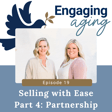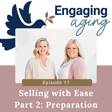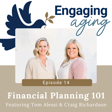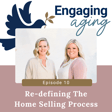Become a Creator today!Start creating today - Share your story with the world!
Start for free
00:00:00
00:00:01

Moving Sucks! Does it Have To?
Moving is one of the top three most stressful life events. The older we become the more challenges we often face. From logistics to emotions and family dynamics, we address them all in this episode!
Change Can Be Difficult. Moving Doesn’t Have to Be.
Transcript
Introduction to Engaging Aging Podcast
00:00:02
Speaker
Welcome to Engaging Aging with Erin and Lauren. Join us as we share laughter, tears, and demystify the realities and silver linings that occur later in life.
Challenges of Moving with Joe Scott
00:00:16
Speaker
Welcome back. Today we are joined in the studio with Joe Scott, our Director of Move Management here at Dovetail Companies. And we are talking about how much moving sucks. It does. It sucks. Everyone has experienced the pain of moving at least once or twice in their life, right?
00:00:34
Speaker
You have to pack the boxes. You have to be gentle with your belongings. You have to start the downsizing process. And there are so many emotions that go with that.
Emotional Attachments in Moving
00:00:47
Speaker
Joe, I a couple of weeks ago, or has it been over a month now that you told Erin and I that you and Tom were selling your house. Yeah. And you were going to be moving and you are so ready for the challenge that faced you.
00:01:02
Speaker
I was ready for the challenge thinking that I've done it for so long, for so many people. I thought, oh, it's not going to be a big deal, but it really is a big deal. Moving into that house 22 years ago, I was 22 years younger. I thought that I could still do the same sort of stuff.
00:01:21
Speaker
It's been quite a journey for lots of reasons, and the emotions, I didn't think that there were any emotions. Why? Well, I thought, because we've been in our house for a long time, and I hold my emotions in my head and my heart. I don't see them in things or stuff. Tom's very different than that, and he really does attach to things.
Balancing Sentiment and Space
00:01:45
Speaker
I collected a bunch of stuff in the basement for,
00:01:48
Speaker
a clear-out company to come and take. And I told him that they were coming tomorrow. Everything that's there is going to go. He went down and picked out stuff that we had moved from our house, moved into that house 22 years ago. And he wanted to take it. I said, we haven't touched it in 22 years. And I have a sister who's very much like him. And she reminded me that he's different. Let him take it.
00:02:12
Speaker
So what do you notice about Tom, though, that why he wants to take it? Is it just that emotional thing of holding on to it? There were all things that belonged to this. You're always going to use it at some point, right? We're never going to use it. But everybody thinks they are. Yeah, yeah, yeah. No, because it belonged to his parents and his grandparents. And it was important to him. And he's hoping that at some point, his nieces and nephews will want to take it.
00:02:34
Speaker
And we see that with our clients all the time. And I always say that if there's room for things, yeah, take them. And if it really means a lot to you to have it stored in your storage unit at your independent living home or in
00:02:49
Speaker
your assisted living home or an offsite storage or wherever it is, as long as you have space for it, it's not taking up valuable space that you need for other things. You know, I always say to clients, you know, take that. That's why we always take the right sizing approach as opposed to the downsizing. You know, where right sizing is what is right for every person. And, you know, downsizing, we know people think about the very prescribed method of you need X number of these things and two of those things and one of those.
00:03:20
Speaker
And that doesn't always work for people. So I always say, if it's going to fit and it means a lot to you to have it, you know, go ahead and, you know, and take it. So. So I'm so curious, right? Because the whole piece of what sparked to this conversation today.
00:03:34
Speaker
is yesterday we were sitting in the office and I think I said to you, you know, you're moving. It's coming up. And how's it going? And you just kind of look so defeated looking back at me and said, it's a lot. It's exhausting. I, like you said before, you know, you've done this.
00:03:55
Speaker
But what's interesting is you do this every single day of your life as a professional and you make it look so seamless to all of our clients and to their family members and even to our team. And I remember the first time that we actually were interviewing you, you were in a really tight, small crawl space for a client. And so you do this, right?
00:04:19
Speaker
What do you find that has come up in your own personal experience of planning and moving in the actual execution of this that has changed from what you do professionally to what it's like personally because
00:04:36
Speaker
We're all human. This is real. This is real life. And you said to me yesterday, I don't know how somebody that is 85 years old does this on their own or does it with their adult children surrounding them. So talk a little bit about what the emotions have come up and what that looks like for you. I've thought a lot about that because I think that we go into a move with a client and plan that move with them, sometimes with their adult children.
Professional vs Personal Moving Experiences
00:05:00
Speaker
And when we do that, we have a very specific timeline of how things are going to happen. And we have a vision of what it's going to be the day that we unpack them, and they come in the big reveal, and they see what their space looks like. Doing it for yourself, as you're packing those things, you're thinking about how this is going to appear in my new life, right? Where is it going to go?
00:05:31
Speaker
It's a much more personal experience of putting all these things in boxes because you really, you think about the time that you did use it, right? And, you know, I sort of contradict myself. You go down that rabbit hole as you always say. I contradict myself by saying that I'm not really attached to things, but there are things and I sort of remember
00:05:51
Speaker
this is a platter that I got from my mother that we use every Thanksgiving. And yeah, I guess it is important to me, but it's something that we still use. And then I get, you know, go down the whole of thinking, all right, so where are all these platters going to go? And so it's very different when you when you work with a client, you see what their kitchen layout is going to be. You see how much how many things that they, you know, they want to take. And you identify the space as to where everything's going to go. I
00:06:19
Speaker
And you go in there with a very deliberate plan of what is gonna get packed and what you can do in four or five hours to get it all packed with a team. When you're doing it on your own, I don't have that same, I didn't have the same vision of, all right, I have a kitchen that only has X number of cabinets, put these things, these things are gonna go with this cabinet next to the refrigerator, and this stuff is gonna go in the basement. I, at a very high level, sort of had that, but I wasn't as specific as I am when I work with a client.
00:06:47
Speaker
Well, it's so interesting too, because we always say we share tears and tissue in time with our clients, right? And we embrace the emotional aspects of this move with them too. But I think that it's different to your point. We do to a certain extent, right? We know that something is very near and dear to their heart. We're listening to those stories.
00:07:09
Speaker
We're feeling that a little bit, but we're not necessarily feeling that because the personal attachment is not there. So on your side, when their personal attachment is there, it's a little bit different. And you can start to go down that rabbit hole. You don't have somebody sitting in front of you saying, Joe, stop looking at those pictures right now.
00:07:29
Speaker
No, you don't. So I see in myself some of the challenges I see in clients and I think I'm never going to be that way. And I'm pretty blessed that I don't have a lot of stuff and I didn't hold on to a lot of stuff. So clearing out things was not as much an issue as I thought it was going to be. But the
00:07:53
Speaker
The emotions are probably far more alive than I thought, and dealing with Tom's emotions, where he is very emotional about that space, about that house and his landscape design and all of that stuff that he's leaving.
00:08:10
Speaker
I have to sort of always remind myself that there is emotion. He has his emotion to deal with. So that becomes my emotion, right? So how do I sort of deal with that? So it's really helped me put into perspective what our clients are faced with every day. And I can't even imagine doing it by myself had Tom not been there and my having to pack up a home, like all of that.
00:08:35
Speaker
and then do that on my own. I can't even imagine what that's like. And as I said, I can't imagine what that's like being 85 years old. And I know how to do it. I did make myself a plan and I knew what rooms had to be done when they were gonna be done. But still, it's a challenge.
00:08:52
Speaker
And it's also a, you know, it's kind of a kick in the butt when you spend the day getting rid of things and moving stuff out. I was with my brother-in-law and my niece's husband getting rid of things, spending a day moving things that I thought would no big deal. We'll move that couch to my sister-in-law's. We'll move those dressers out, whatever that is.
00:09:11
Speaker
And Saturday afternoon, I realized it sort of hits you in the face that, yeah, you can't do that as much. And when you're at a client's home and you're doing that, you're very specific about what it is. By the time you get to the sort of the packing, you're very specific about what it is. Someone's coming to move things out.
00:09:30
Speaker
I'm not doing that someone is doing it for them. So it really it's at a commercial point and like it just goes away, right? Like that's the whole goal. But sometimes when you're doing it on your own, it's not that way. I mean, yesterday you said you gave us the example of
00:09:46
Speaker
hauling that couch out of your house, bringing it to your sisters, taking a couch that they weren't then keeping and doing something with that. And it's not just the emotional aspect, but it's also the physical aspect. So you're in pain the next day, right? And you're feeling that for a long time.
00:10:06
Speaker
I'm curious though, the practice of going through, removing that couch from your house, taking the legs off of that dining room table, putting them back on, did you ever stop to think, I'm losing that emotion of like what that next step is for us because I'm so frustrated as part of this process and putting this all together myself and dealing with it or has there been some silver linings in that for you as well?
Embracing New Beginnings
00:10:36
Speaker
I think that it's the end goal. I'm looking so forward to our new space and that next part of our life. So knowing that that goal is there and that's sort of what will sort of be there after all of this is done is sort of what is the silver lining. Like there's a very specific reason to do it.
00:10:57
Speaker
And I think about if I were in crisis like some of our clients are and I had to get rid of all of that stuff and wasn't looking forward to having to go to a community that I wasn't crazy about, but it was the only option for me because I didn't plan. If I had to do all of this and it was
00:11:17
Speaker
25 years from now, and it was crisis, it would feel very different. I have a positive view of what's coming next. And we talk all the time about planning. And if you don't plan, it really can impact how you live your best life or don't.
00:11:35
Speaker
And having the silver lining is having something to look forward to. So getting through all of that. So that really has been for me thinking about it's going to be over. You know, it'll be over soon and we'll get through it. I'm curious. You mentioned a couple of times that you have an appreciation for what our clients go through. Right. And in our business, we are here to provide one point of contact to really allow our clients to have the emotional space.
00:12:03
Speaker
to go through this move while we handle the physical aspects of it. For some of those individuals, those older adults and their families that are out there that want to do this on their own, what are some recommendations that you would give today to be able to successfully get through that move on your own? Because we know we're not
00:12:24
Speaker
the right, you know, service for everyone. And sometimes, you know, you've got son-in-laws and grandchildren that can help do the heavy lifting and you want them to be part of that process as today. So what are some really high level points that you would offer to some folks that are going through this on their own and how to navigate that? Right. You know, you and Aaron say it all the time that
00:12:47
Speaker
How do you envision your retirement to be? How do you envision your next step to be? And I think that regardless of when it is our clients are going to move, they need to think about that. Or if they're not going to be our clients, think about what you want your next step to be. And as part of our downsizing right-sizing program, we talk about maintaining a right-sized life. Which is easier said than done sometimes. It is easier said than done.
00:13:14
Speaker
I know and you know that there is gonna be a lot of emotion that's gonna be attached to that process, especially if they're gonna do it on their own. And especially if they have family that's involved in doing it with them because they have a very different opinion about what's right for you, what they want, what they may not want, all of that stuff. So I think that that adds a lot to it. So dealing with
00:13:37
Speaker
the items that you have, if you're moving in a year, two years, five years, whatever that is, dealing with those items right now so that you're ready to move ahead with the move and think about, have your silver lining, think about what that next step is.
00:13:54
Speaker
I always quote that the gentle art of Swedish death cleaning written by Margarita Magnuson, a woman in her 80s in Sweden, and she says that she describes death cleaning as preparing your home in an orderly fashion so that the closer you get to leaving the earth, it is left in a orderly fashion.
00:14:19
Speaker
for those that you leave behind. And when I read that and I say it all the time that she said the closer you are to leaving the earth, the day we're born, we're one day closer. So I really see that as the time is now. And if you can deal with all of those items that you know are stored away in the basement or in the attic or you're keeping for someone because you think they want them,
00:14:44
Speaker
deal with all of that right now, regardless of when your move is coming or maybe your move is not coming. You know, maybe you're going to, you know, age in place, but think about your belongings and how you want to manage those belongings in a way that doesn't provide or present a barrier to getting to the next place. Right. And then there's not an obstacle for you to get to the next place as well.
00:15:10
Speaker
What do you do in those situations? You say start in the basement, start in the garage. What do you do with those situations where you have accumulated items from your mom, your dad, just as similar as Tom did, and you have a thought, it can't come with me because I'm right sizing into a new space. I don't have the room for it. I am not going to get a storage unit to keep holding on.
00:15:38
Speaker
And my vision has always been that my children will take some of these things and it's going to pass down from family member to family member. What does someone do when you're stuck in that situation and you've had this thought in your mind forever that your daughter's going to take your mother's china and she comes and she says, I don't want it.
00:16:01
Speaker
I don't want it. And instead of her just taking it and figuring out something to do with it later, she doesn't want it. So I feel like that would derail someone in that move. What do you do? Well, there were so many realities to that process. If you're just doing the right sizing just to live a right sized life in your current space or you're getting ready to move,
00:16:26
Speaker
There's a lot of realities, and one is that people don't want your stuff. Whether it's people that are close to you, your children, your nieces, nephews, neighbors, whatever that is, or even resale or thrift stores, consignment stores, they don't want it because the value that you put on it is not the value that they put on it.
Rehoming Belongings and Its Rewards
00:16:46
Speaker
And I think it's really important to, number one, say to clients that when things are given a new life,
00:16:55
Speaker
That is the best thing that you can do for them because I always say, we talk about brown furniture all the time and there are people who don't have any bedroom sets and a brown bedroom set is better than none. So I say that all the time to clients and it really does resonate with them and they think, yeah, that's great. And I say that, be prepared that your son or daughter does not want that desk. And I said, how many things in your house right now did you inherit that you really didn't want?
00:17:24
Speaker
And inevitably, it's a piece of furniture that they point at or it's something that is cluttering up their basement. I said, I'll say, do you want to do that to them? So let's think about asking them right now, what is it that they want? You may be thinking about something that you want to donate or trash, and it may be something that's really important to them, and they do want it.
00:17:47
Speaker
So you have to ask the question and communicate openly about your belongings and managing belongings with your loved ones. So if you do say, those dishes, I want you to have those dishes, but they come in and say, I just really want that chipped, you know, pitcher that you always served us lemonade in. That's a very, then you say, you feel so great about giving them the pitcher that what you thought you were going to get from giving them to China goes away.
00:18:18
Speaker
So don't always make those assumptions because there could be something beautiful on the other side that they want. I said to Erin the other day, we came from a client's house and I could see this. Our client really wanted her daughter to have a painting and the daughter lives a very different life.
00:18:36
Speaker
and didn't have room for the painting and was very honest with it, you know, gave reverence to that painting, but just didn't feel as though it went with her motif. And I know a painting is not really the example I want to use in this moment, but I said to Erin, we see this all the time with brown furniture as well.
00:18:55
Speaker
They don't want the brown furniture. They don't necessarily want these cluttered homes. But yet we work with an amazing vendor, Household Goods, not even a vendor, but an organization. And I said to Erin, I wish sometimes our clients could go on a tour of Household Goods with us to see that experience of all of this beautiful furniture coming in that are years old and
00:19:22
Speaker
the faces on the folks that are receiving that on the other end because they don't have the means to be buying this furniture and just the happy faces knowing that
00:19:34
Speaker
they can go out and provide for their family comfortably just to have those belongings around them. And even though your adult children or your family might not want it, it is really bringing a smile to someone else's face and new life. That's one of the things I'm looking forward to as part of our move.
00:19:54
Speaker
Next week, we have Clean Up Your Housecoming, and they really are our broker to household goods to take some furniture that I tried to sell on Facebook. And people come back and say, I'll give you $10 for it. I'd rather give it away. So I just stopped and said, I'm so much more comfortable giving all of this stuff to household goods. It is going to get a brand new life, because we had the opportunity to walk through household goods in Acton.
00:20:23
Speaker
At the time they were really serving Afghan families. And now I think are helping families from the Ukraine. And to watch people walk through a space, a warehouse that has all the kitchen tables in one section and all the sofas and chairs in another.
00:20:42
Speaker
And they have a very prescribed method of how much you get based on how many people are in your household. And you can go and you can choose that table. You can go and choose two chairs. And to watch those clients go and sit in those chairs or sit at the table. And it was a used piece of furniture. And they were going to get that and it was going to furnish their home.
00:21:05
Speaker
is really an amazing feeling. So yes, I think we, I've often shared that with clients and they chronicled it an amazing piece on household goods. And I say, you know, look that up and see, and you'll get a really great feeling about giving that, you know, giving that new life.
00:21:21
Speaker
Yeah, that's great.
Conclusion and Future Topics
00:21:23
Speaker
I just want to say thank you for sharing your personal story because I think you know sometimes we forget that we are human and we're going to experience these emotions and to expect these emotions as they come up and you know it can be very difficult and sometimes it's
00:21:39
Speaker
It takes everything for us to ask for help, right? I mean, we've offered you a little bit of help too and you haven't taken it, but you like to control that process. And we have to remember that our clients like to control that process too. So getting to know who you are for you, you probably learned a lot about Tom that maybe you didn't know about him.
00:21:58
Speaker
beforehand as well, but there are some beautiful things as that as well. So moving can suck, but it doesn't have to, right? And we just have to remind ourselves all of the time that there can be some silver linings around that as well. So more to come on moving and what we can do with our belongings in future podcasts, but thank you so much for joining us.
00:22:25
Speaker
Thank you for joining us today. To continue the conversation, follow us on social media at Dovetail Companies or visit us online at dovetailcompanies.com. And remember, change can be difficult if aging doesn't have to be.



















